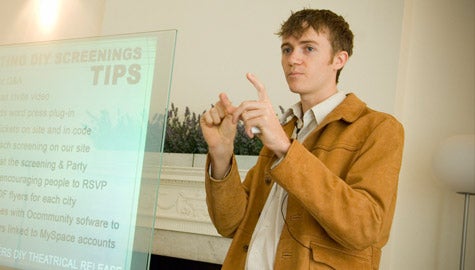Past Your Converted Adsense Code
How crowdfunding financed a startup to help filmmakers flourish.
 |
| Arin Crumley spoke to attendees at the Cross-Media Forum in 2008. Photo credit: Power to the Pixel |
To raise money to launch the company, they turned again to Crumley's online community. Using Kickstarter, a crowdfunding site, they raised $12,413 in seed money from 236 backers, surpassing their goal of $10,000. People use Kickstarter to raise money for creative projects and technology ventures. Patrons pledge funds in exchange for something other than equity -- for example, access to a product. Users set a fundraising goal and deadline, and they don't get any money unless they hit their target.
Masterton and Crumley talked about how they raised funds on Kickstarter and what other startups can learn from their experience. Below are edited excerpts of their interviews.
 |
| Kieran Masterton Photo credit: Courtesy of the company |
Masterton: We needed about $10,000 [to build the site]. We thought about angels, but decided the people most interested in the website were those with a vested interest in it: filmmakers and distributors and so forth.
Entrepreneur: How long did it take to raise the funds?
Masterton: The campaign lasted one month. In retrospect, we could have gone shorter. The stats show longer campaigns don't make their money. A shorter campaign shows urgency. If the campaign has four days left, I'll help out. If you have 62 days left, people think, ‘I'll come back.' And then they might not.
Entrepreneur: Why was crowdfunding a good choice?
Masterton: Arin had a big following online. The filmmaking community looked to him for guidance on distributing their films because of the success he had with Four Eyed Monsters.
Crumley: Crowdfunding gave us a core base of users right away. Also, one thing some people got [in exchange for funding] was a one-hour consultation with me about distributing their film. That's research -- we're getting insights into filmmakers' concerns and how deals work. These [conversations] are happening over the next year.
Entrepreneur: What ideas or plans have come from those talks?
Crumley: I'd like to expand OpenIndie to include file sharing. It's an easy low-cost way to move files. A file-share movie is high enough quality for a theatrical screening. By using Apple TV and file-shared movies, anything can be a movie theater -- a café, a community center.
Entrepreneur: Any downsides to the Kickstarter campaign?
Masterton: You receive an infusion of [funds], but it's not a typical angel situation where you receive money and get more if you hit certain targets. [Kickstarter] is a one-off payment. We tried twice afterward to raise more money with Kickstarter and weren't successful.
Entrepreneur: What went wrong?
Masterton: The second one was too soon after the first. People wanted to see what they were investing in, and we weren't far enough along yet. Also, I don't think Kickstarter works as a rolling campaign. It should be money to kick start your project, as the name says.
Entrepreneur: How did you structure your campaign?
Masterton: We pre-sold our product. We wanted 100 filmmakers to give $100, and they could [post a film on the site] in return. Then fans of Four Eyed Monsters gave $20, and Arin gave signed DVDs of the film in return for that.
Crumley: You have to show the greater good [of your project] but also explain their individual good -- what's in it for them, like the consultations and DVDs. The [people who supported us] have the first films on the site. We call them the founding filmmakers.
Entrepreneur: How did you promote it?
Masterton: Blogging, answering people's questions and talking to a few reporters who picked up the story. And there is a big film-making community on Twitter -- a lot of people follow Arin. We did online radio shows and filmmakers [announced] on Twitter or their blog that they gave to this project, and you should, too.
Entrepreneur: What's your relationship with contributors now?
Crumley: I've told people be careful of what project you crowdfund, because you have this karmic commitment way into the future. As a small company, you change a business plan as you go. But if you make a video and campaign, and in it say you're going to do all these things that are contingent on 1,000 other variables, then you have to do it. If not, it would be catastrophic, because they have expectations. So if you change course, be careful how you do it. Make sure [your backers] understand what you're doing and why.









0 comments:
Post a Comment